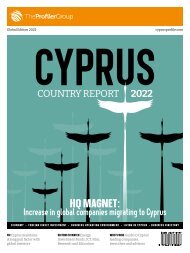2020 Cyprus Country Report
The 2020 Cyprus Country Report features in-depth articles on the economy, foreign direct investment, international trade and headquartering as well as detailed sector profiles and insights from Cyprus’ 100 most influential political, economic and business leaders shaping the future of their country and its industries.
The 2020 Cyprus Country Report features in-depth articles on the economy, foreign direct investment, international trade and headquartering as well as detailed sector profiles and insights from Cyprus’ 100 most influential political, economic and business leaders shaping the future of their country and its industries.
Create successful ePaper yourself
Turn your PDF publications into a flip-book with our unique Google optimized e-Paper software.
Government Structure<br />
President of the<br />
Republic of <strong>Cyprus</strong><br />
Nicos Anastasiades<br />
Minister of Foreign Affairs<br />
Nikos Christodoulides<br />
Government & Politics<br />
Minister of Finance<br />
Constantinos Petrides<br />
Minister of Interior<br />
Nicos Nouris<br />
Minister of Defence<br />
Charalambos Petrides<br />
Minister of Health<br />
Constantinos Ioannou<br />
Minister of Education<br />
and Culture<br />
Prodromos Prodromou<br />
Minister of Transport,<br />
Communications and Works<br />
Yiannis Karousos<br />
Minister of Energy,<br />
Commerce and Industry<br />
Natasa Pilides<br />
Minister of Agriculture,<br />
Rural Development<br />
and Environment<br />
Costas Kadis<br />
Minister of Labour, Welfare<br />
and Social Insurance<br />
Zeta Emilianidou<br />
Minister of Justice<br />
and Public Order<br />
Emily Yiolitis<br />
Government Spokesman<br />
Kyriacos Kousios<br />
Under Secretary to<br />
the President<br />
Vasilis Palmas<br />
Shipping Deputy Minister<br />
Vassilis Demetriades<br />
Deputy Minister for Tourism<br />
Savvas Perdios<br />
the Berlin Wall. The population of the southern<br />
two-thirds of the island, controlled by the government<br />
of the Republic of <strong>Cyprus</strong>, is almost entirely<br />
Greek Cypriot, while the population of the northern<br />
third, controlled by the breakaway Turkish<br />
Republic of Northern <strong>Cyprus</strong> (recognised only<br />
by Turkey) comprises Turkish Cypriots, settlers<br />
from the Turkish mainland and around 42,000<br />
Turkish troops.<br />
FROM FOREIGN RULE TO THE<br />
REPUBLIC OF CYPRUS<br />
Colonised by the ancient Greeks in 1400 BC,<br />
<strong>Cyprus</strong> has had a succession of foreign rulers<br />
through the centuries, including the Romans, the<br />
Byzantines, the Franks and the Venetians, whose<br />
300-year rule ended in 1571 when the island<br />
became part of the Ottoman Empire. After almost<br />
250 years of Ottoman rule, <strong>Cyprus</strong> was placed<br />
under British administration in 1878. The island<br />
finally became independent in 1960 after a protracted<br />
and violent struggle against the colonial<br />
power between 1955 and 1959. After lengthy negotiations,<br />
Britain, Greece and Turkey drafted a<br />
constitution for the new state, along with Treaties<br />
of Guarantee and Alliance. The Republic of <strong>Cyprus</strong><br />
came into being in August 1960. The constitution<br />
and the two accompanying treaties established a<br />
complex power-sharing structure between Greek<br />
and Turkish Cypriots, which precluded partition<br />
of the island, or union with Greece or Turkey. Both<br />
countries, along with Britain, were also designated<br />
guarantors of the independence, territorial integrity<br />
and security of the Republic. The constitution<br />
provided for a Greek Cypriot president and a<br />
Turkish Cypriot vice president, while the Turkish<br />
Cypriot community was granted three ministerial<br />
positions out of a total of 10, and 15 out of<br />
the 50 seats in the House of Representatives. After<br />
intercommunal strife between the two communities<br />
in 1963, Turkish Cypriots vacated their seats.<br />
Since then, ministerial positions have increased to<br />
11, all duties carried out by Greek Cypriots and<br />
the number of parliamentary seats has extended<br />
to 80 of which 30% (24) are allocated to Turkish<br />
Cypriots as per the constitution but remain vacant.<br />
INTERNATIONAL RELATIONS<br />
<strong>Cyprus</strong> joined the EU on 1 May 2004 together<br />
with nine other European countries. Under the<br />
terms of its accession the entire island is considered<br />
technically to be a member of the European<br />
Union, despite its continued division and the fact<br />
that the government of the Republic has no effective<br />
authority in the northern part of the island.<br />
However, the terms of the acquis communautaire,<br />
the EU’s body of laws, have been suspended<br />
in the north. <strong>Cyprus</strong> has historically followed a<br />
non-aligned foreign policy, although it increasingly<br />
identifies with the West in its cultural affinities<br />
and trade patterns, and maintains close relations<br />
with Greece. Turkey refuses to recognise the<br />
government of the Republic of <strong>Cyprus</strong>, arguing<br />
that the latter – as established by the Constitution<br />
of 1960 – ceased to exist when the intercommunal<br />
violence that broke out in December 1963 ended<br />
Turkish Cypriot participation in government.<br />
As a result, Turkey still refuses to allow Cypriotflagged<br />
vessels access to its ports, despite pressure<br />
from the European Union. <strong>Cyprus</strong> is a member<br />
of the United Nations and most of its agencies,<br />
as well as the Commonwealth of Nations, World<br />
Bank, International Monetary Fund and Council<br />
of Europe. In addition, the country has signed the<br />
General Agreement on Tariffs and Trade (GATT)<br />
and the Multilateral Investment Guarantee<br />
Agency Agreement (MIGA). n<br />
Discover more at www.cyprusprofile.com<br />
<strong>Country</strong> <strong>Report</strong> CYPRUS <strong>2020</strong> 17

















